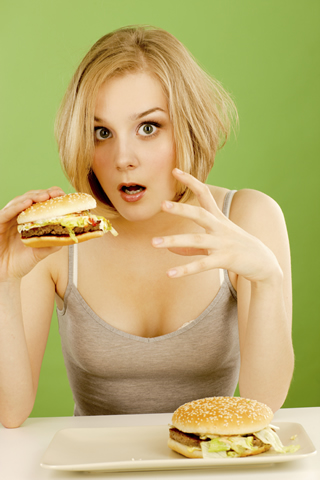 Do you mysteriously go up a dress size (or two) in winter? Do your clothes shrink in the wardrobe. Or is the reason that you find yourself irresistibly drawn to big bowls of pasta, thick slices of hot buttered toast and cake as soon as the nights draw in? In June you can manage on a light salad. Come November it’s Lancashire Hot Pot and rice pudding or bust.
Do you mysteriously go up a dress size (or two) in winter? Do your clothes shrink in the wardrobe. Or is the reason that you find yourself irresistibly drawn to big bowls of pasta, thick slices of hot buttered toast and cake as soon as the nights draw in? In June you can manage on a light salad. Come November it’s Lancashire Hot Pot and rice pudding or bust.
The desire for comfort food in winter may seem incomprehensible. Why undo all the good work done over the summer with a four month hot chocolate-athon? But there is a reason we crave comfort foods in winter. There are physical and emotional mechanisms driving our desire for stooge.
Understanding what they are means that you can then employ tactics to lessen their impact and stop comfort eating. So, put down that tiramisu, take control of your winter eating and say goodbye to that seasonal spare tyre for good.
Why winter makes you hungry
In winter there is less daylight (obviously). This is not just rubbish for putting your make-up on, driving and evenings spent making scale models of the Eiffel Tower out of matchsticks, it has a dramatic effect on two hormones: serotonin and melatonin.
Seretonin is what is called an ‘endogynous’ anti-depressant, that is we make it naturally in our bodies. It helps us feel happy and content and is a potent appetite suppressant. Modern anti-depressant medications like Prozac boost serotonin.
Melatonin is the pull to seretonin’s push. While serotonin helps us feel awake and alert, melatonin makes us feel groggy. It triggers sleep.
These two hormones are actually part of the same hormonal pathway. They are at different points on a sort of hormonal widget production line. An amino acid called tryptophan is fed in at one end and trundles along to become Widget Type A – serotonin. Only, some of the tryptophan is diverted along the way and goes onto a different conveyor to become Widget Type B- melatonin.
The amounts of Widgets A and B vary. So what tells the machine to make more of one than the other? Sunlight. Sunlight switches off melatonin production and increases serotonin production. Remember, serotonin suppresses appetite, so the lighter the days, the less hungry you feel. Conversely, the darker the days, the lower your serotonin and so the more you want to eat.
The Cold Weather Comfort Food Link.
It would be good if the increased hunger was for spinach and cucumber. Unfortunately, low serotonin in winter tends to drive hunger for specific foods, comfort foods. The classic comfort foods are spaghetti Bolognese, toast and butter and syrupy puddings. What all these foods have in common is a high sugar content.
If we go back to the hormonal widget production line, this may seem strange. After all, serotonin is made from the amino acid tryptophan and amino acids come from protein foods. So, when you’re low in serotonin, it would make sense for you to crave protein, wouldn’t it?
It would, but for tryptophan to be made into serotonin, it first has to be delivered to the factory and that the help of another hormone insulin. Insulin helps tryptophan jump across the blood/brain barrier and insulin is stimulated by…ta dah! Sugar.
So when you crave that bowl pf pasta or half a loaf of bread, your body is actually quite cleverly attempting to increase your serotonin levels. It’s just a shame you can’t do up your jeans afterwards.
The Vitamin D Connection
Sunlight doesn’t just stimulate serotonin production, it also enables us to make vitamin D in our skins. Vitamin D is important for immune system function and bone strength but it also plays a role in mood. Low vitamin D is associated with depression. What do depressed people do? Some, the clinically depressed who can’t get out of bed, may stop eating altogether.
Those with milder depression often over-eat and not cucumber sticks, that’s for sure. Depressed people often go for high fat, high sugar combos like Ice-cream, cake and chocolate because they stimulate another part of the brain – the reward centre, governed by another hormone, dopamine. The problem is the more you stimulate the dopamine pathway, the more you want to. This is the one slice of cake is never enough scenario familiar to those who binge on comfort foods.
Of course you can go off on a chocolate binge at any time of the year, but low Vitamin D and the associated depression can be a potent trigger.
Bad Mood Food
So low vitamin D is depressing and so is low serotonin . This sets up a double whammy effect that sends you straight to the bakery aisle.
Less Energy Equals More Hunger.
There is one more reason winter can drive you to comfort eat. Winter makes you tired and tired people eat more. The tireness is the result of melatonin levels not being offset by sufficient serotonin to switch off night-time grogginess. In winter a lack of sunlight can result in melatonin staying artificially elevated. Feeling exhausted when your alarm goes off will cause some to reach for a coffee to jump start them, other add a doughnut. Whatever, research has shown that tiredness increases calorie intake and snacking.
Why Winter Comfort Food May Be A Girl Thing.
Ever wondered why your partner doesn’t put on a layer of extra padding in winter? The bad news is women are born to manufacture less serotonin than men, so we start off at a lower base. Plus, serotonin and the female hormone oestrogen are linked. When oestrogen drops (premenstrually and at menopause), so does serotonin. Winter PMS can be a perfect hormonal storm, triggering mega chocolate monster behaviour.
So What Can You do?
A lot. There are both dietary and lifestyle changes you can make that can reduce cravings for comfort foods. Here’s a 10 point plan to beat winter comfort eating.
- Boost serotonin levels naturally by eating tryptophan-rich foods such as turkey, chicken, low fat yoghurt, cheese and eggs. Make sure you get it into the brain by also eating a little sugar (not too much!).Instant tryptophan pick-me-ups include dates, papaya and banana.
- Eat foods that are a source of essential fats to support brain function and hormone action. Include oily fish (salmon, mackerel and sardines) as well as olive oil, nuts and seeds in your diet.
- Eat your vitamin D. You may not be able to make it yourself using sunlight, but you can increase your vitamin D levels by eating eggs, fish and dairy foods.
- Eat little and often to balance your blood sugar. Blood sugar that see saws up and down causes sugar cravings that can drive comfort eating.
- Get outside even if it is grim. Half an hour outside at lunchtime with sleeves pushed up can make a difference to vitamin D levels. A winter sun holiday is better, but needs must.
- Exercise. Cardio exercise like running, cycling or swimming causes the release of feelgood endorphins. These can offset to depressant effects of low serotonin and reduce your desire to comfort eat. Even better if you can exercise outside to boost vitamin D as well.
- Consider an S.A.D lamp to wake you in the morning to simulate the effects of more sunlight.
- Socialise. When the weather is awful. It’s tempting to cocoon on the sofa with a onesie and a large packet of biscuit. But research shows that being part of a social network and supporting and being supported by others can improve self esteem and mood. Feeling happier reduces appetite.
- Consider trying the herbal supplement 5HTP. It can help to increase serotonin levels. Take your 5HTP at night at least two hours after eating with a little hit of sugar ( a glass or orange juice or a few dried apricots are ideal) to ‘push’ it into the brain.
- Do a Gratitude List. Be alert during your day for any small things that make you feel good. They can be as insignificant as seeing a bird on a fence, someone letting you out in traffic or getting money off at the supermarket. Then, at night, before you go to sleep, run through this list in your head to remind yourself of all the good points in your day.
Lowri Turner is a nutritionist/Hypnotherapist. Her new book ‘What Hunger Type Are You?’ (Nourish books) is available bookshops or from www.lowriturner.com

 If you’ve failed on diets before, it’s easy to lose hope.
If you’ve failed on diets before, it’s easy to lose hope.

